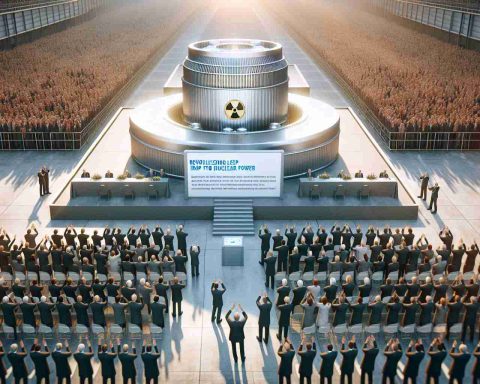“`html
- IonQ and GDIT are collaborating to advance quantum computing for U.S. government and defense sectors.
- This partnership focuses on quantum AI, resource optimization, and anomaly detection to enhance operations.
- IonQ’s $54.5 million contract with the U.S. Air Force Research Lab marks a significant investment in quantum technologies.
- A $5.7 million initiative involves multi-node blind quantum computing with the Applied Research Laboratory for Intelligence and Security.
- Quantum innovation could redefine intelligence analysis, logistical planning, and cybersecurity.
- Government agencies are increasingly committed to leveraging quantum advancements for data analysis and mission execution.
“`
In a groundbreaking move, IonQ has joined forces with General Dynamics Information Technology (GDIT) to revolutionize quantum computing solutions for U.S. government and defense sectors. This strategic alliance is poised to redefine how intelligence analysis, logistical planning, and cybersecurity are approached through the lens of quantum innovation.
The partnership aims to harness the incredible power of quantum bits, or qubits, offering a fresh approach to solving complex challenges that traditional computers can’t handle. By focusing on quantum artificial intelligence, resource optimization, and anomaly detection, IonQ and GDIT are set to enhance government operations significantly.
The importance of this collaboration cannot be overstated. As government agencies increasingly explore quantum technologies, the potential to transform data analysis and mission execution becomes more tangible. Imagine making quicker, more precise decisions, thanks to the unparalleled processing capabilities of quantum computing.
Earlier this year, IonQ and GDIT worked with a major intelligence agency to push its readiness for quantum advancements. This collaboration underscores a broader commitment within the U.S. government to stay ahead of quantum developments that have the potential to reshape conventional encryption and computing paradigms.
The significance of IonQ’s role is further highlighted by its $54.5 million contract with the U.S. Air Force Research Lab—the largest quantum contract awarded in the U.S. in 2024—and additional projects like the $5.7 million multi-node blind quantum computing initiative with the Applied Research Laboratory for Intelligence and Security.
This partnership signals a bold step into the future, where quantum computing might just be the key to unlocking new dimensions in defense and government operations. Keep a watchful eye on this exciting evolution, as it promises to transform our world in unimaginable ways.
The Quantum Leap: How IonQ and GDIT Are Reshaping U.S. Defense
How is IonQ’s partnership with GDIT transforming defense with quantum computing?
The collaboration between IonQ and General Dynamics Information Technology (GDIT) heralds a pivotal change in U.S. defense technology through quantum computing. While traditional computers struggle with complex computations, quantum computers leverage qubits, introducing game-changing capabilities in intelligence analysis, logistical planning, and cybersecurity. This partnership could radically improve decision-making speed and accuracy for government agencies.
The significance of IonQ’s innovation is underscored by its major contracts, including a $54.5 million collaboration with the U.S. Air Force Research Lab and a $5.7 million project with the Applied Research Laboratory for Intelligence and Security.
What are the primary benefits and limitations of quantum computing in government applications?
Benefits:
1. Enhanced Processing Power: Quantum computing offers unparalleled problem-solving abilities, potentially handling tasks that are computationally prohibitive for classical computers.
2. Improved Anomaly Detection and Resource Optimization: Quantum capabilities can refine analysis and resource management within government agencies, making operations more efficient and effective.
3. Advanced Cryptography: Quantum cryptography promises stronger protection for sensitive government data.
Limitations:
1. Technical Maturity: Quantum computing technology is still in its nascent stages and faces challenges in terms of error rates and system stability.
2. High Costs: The infrastructure required for quantum computing is expensive, potentially limiting widespread adoption in the short term.
3. Complexity: Quantum systems require specialized knowledge, which can pose a challenge for integration within existing IT structures.
What trends are emerging from IonQ and GDIT’s partnership in quantum computing?
The partnership is spearheading several key trends in the realm of quantum computing:
1. Strategic Alliances for Defense Advancement: Collaborations like IonQ and GDIT’s reflect a trend of strategic partnerships aimed at accelerating technological advancements in defense.
2. Push for Quantum Readiness: Government agencies are increasingly prioritizing readiness for quantum advancements, as evidenced by the commitment shown in their recent collaborations.
3. Investment in Quantum Research: Significant investments highlight the prioritization of quantum computing as a critical future technology, with continuous research efforts aimed at overcoming current limitations.
For more details on quantum computing and related innovations, visit IonQ at the IonQ website and General Dynamics Information Technology at the GDIT website.
The source of the article is from the blog qhubo.com.ni













